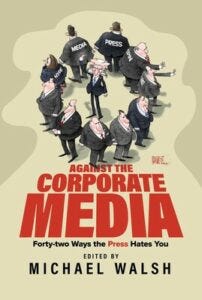In my first year at Time Magazine, I was sitting in the Miami airport with my bf, who had had already a starry career, Moscow, Berlin, White House correspondent, and we were chatting away happily with a couple of women of indeterminate age. I had just escaped snowy London; the house in which I lived had no central heating because my landlady felt that “central heating kills a house”. So I was ebullient and finally, not cold.
“What do you two do?” one finally asked. “We work at Time magazine,” I chirruped like an idiot. I felt rather than saw a sharp recoil from said boyfriend and within a second their attitudes had shifted. It was like Kennedys had dropped from heaven into their lives. They were in awe of us; it was awful.
Today, the attitude would be of instant dislike and contempt, which would probably flare to anger. The only people who “like” the media are the ones who work in it and those languishing in some subsidized charmed circle of the obvious-to-them superior types. The rest of us?
We loathe the media. Loathe.
Why? For the next few days, I am going to run short - 1-3 minute reads - excerpts from a new book, Against the Corporate Media, 42 Ways the Media Hates You - a book of essays to which I contributed, along with forty-one others on just what happened. It will be published on September 10th. My purpose is that you come away from this somewhat enlightened as to what the hell happened, and how a once respectable profession became seedy and dishonest. The book provides a clear direction towards root and branch reform. And perhaps you will buy the book.
Checking the Fact Checkers
an excerpt from Against the Corporate Media, coming Sept. 10 from Bombardier Books. "Checking the 'Fact-Checkers'," by Mark Hemingway.
Among the myriad of ways that America turned into a dystopian nightmare in 2020, the hysteria over Covid and Donald Trump’s possible re-election created an information landscape that Americans thought was unthinkable a decade ago: Powerful institutions have normalized widespread, Soviet-style political censorship. What’s more, the American media have been the biggest cheerleaders for singling out and punishing people for no other reason than they have departed from the enforced ideological consensus by being willing to state demonstrably true facts.
There’s much to be said about how we got to this place, but it’s worth zeroing in on two particular mechanisms responsible for this state of affairs. The first is the rise of politicized media “fact-checkers,” and the second is Facebook, the social media site. The fact that these two entities have now joined forces means that speaking freely online without an algorithm slapping a warning label on innocuous opinions is now impossible. The Facebook-owned site Instagram has actually run a “fact check” on a meme that criticized lawmakers who “spend trillions on bills they haven’t read, but want details on how you spend $600.” They also have algorithms psychoanalyzing the potential for extremism. People in Facebook groups dedicated to canning food have been receiving warnings that say, “Are you concerned that someone you know is becoming too prepared?”
While I confess that I didn’t see this censorship algorithms regime gaining power so quickly, as a reporter in D.C. for more than twenty years, I did see plenty of warning signs. One in particular was hard to ignore: In the summer of 2018, I was sitting in a staff meeting at the now-defunct magazine The Weekly Standard when an editor at the publication started yelling at me.
At the time of the argument, The Weekly Standard was four months away from being shuttered, and though no one in the meeting knew we were facing the axe, a profound sense of unease had descended on the place. A hardline opposition to Trump wasn’t universally shared by the magazine’s staff, but for the two years following his election, top editors at the magazine regularly lambasted Trump and indulged in some regrettably erroneous Russia-collusion reporting. This approach was not appreciated by our regular subscribers who had overwhelmingly voted for the president.
And the argument that led to me getting yelled at was another exhibit in prosecuting the case for how things at The Weekly Standard had gone wrong: We had gone from being an outlet that regularly published hard-hitting media criticism to enabling the worst media innovation in decades—so-called fact checking.
In 2017, editors above my paygrade decided that we were going to be one of a handful of media outlets that agreed to collaborate with Facebook for the social media giant’s “fact checking” program. In exchange for a few crumbs from a company with $700 billion, we would write “fact checks” taking politicians and pundits to task for spreading “disinformation” that Facebook would then use to make content-moderation decisions. In addition to writing fact check columns for our website, we would be hiring and employing an in-house fact checker whose salary was paid by Facebook. This fact checker would also be serving as a traditional in-house fact checker, going over magazine articles pre-publication to root out “errors.” The editors saw this as a win-win.
I was never consulted by the editors about this decision to work with Facebook for several obvious reasons. In 2016, I wrote a piece for the magazine’s website bluntly calling Facebook’s plan to collaborate with outside media organizations to fact check content on the platform “a terrible idea.” And years before that, in 2011, I had written a cover story for the magazine headlined “Lies, Damned Lies, and ‘Fact-Checking.’” It was the first major—and deeply critical—examination of media “fact checking” organizations, such as PolitiFact and The Washington Post Fact Checker. The article made a splash and I spent years afterwards writing tens of thousands of words inveighing against the dishonest tactics of corporate media “fact checkers” that were now working for Facebook.
The actual track record of media fact-checker malpractice and dishonesty isn’t up for debate. Long before Trump, there were critical university studies showing that fact checkers accused Republicans of lying three times as often as Democrats. Further, fact checkers’ reticence to fact check Democrats was pretty clearly tied to helping Democrats win elections. PolitiFact rated Obama’s famously dishonest 2012 campaign promise about the Obamacare law—“if you like your health insurance, you can keep your health insurance”—as “true” six different times. When the law phased in after Obama had lied to secure his re-election, millions of Americans were suddenly kicked off their health insurance plans. PolitiFact then disingenuously made it “lie of the year” in 2013, one year after telling the truth about the law might have made a difference in the election...
It is arguable we have never had a completely free media, but today, independent media is pretty much there. Readers are exercising their choice and subscribing to the writers they trust. If you are inclined, you can buy a inexpensive annual subscription to Absurdistan here. And you can continue to Absurdistan’s reporting fund here. PayPal.Me/ElizabethJNickson. I will have Buy Me A Coffee up soon, since some of you prefer not to use PayPal (quite rightly).
Elizabeth Nickson was trained as a reporter at the London bureau of Time Magazine. She became European Bureau Chief of LIFE magazine in its last years of monthly publication, and during that time, acquired the rights to Nelson Mandela’s memoir before he was released from Robben Island. She went on to write for Harper’s Magazine, the Guardian, the Observer, the Independent, the Sunday Telegraph, the Sunday Times Magazine, the Telegraph, the Globe and Mail and the National Post. Her first book The Monkey Puzzle Tree was an investigation of the CIA MKULTRA mind control program and was published by Bloomsbury and Knopf Canada. Her next book, Eco-Fascists, How Radical Environmentalists Are Destroying Our Natural Heritage, was a look at how environmentalism, badly practiced, is destroying the rural economy and rural culture in the U.S. and all over the world. It was published by Adam Bellow at Harper Collins US. She is a Senior Fellow at the Frontier Center for Public Policy, fcpp.org. You can read in depth policy papers about various elements of the environmental junta here: https://independent.academia.edu/ElizabethNickson





It is the emergence of powerful technology that has amplified the voices of the morally weak-minded. These are individuals with little sense of self who rely on audience size for a measure of self worth. Hollywood actors are full of such people who sell their souls, willing to submit to any debauchery, to climb the ladder of fame. They feel empty till there is an audience of admirers. It is an addiction nearly as strong as heroin, especially for younger stars seeking to establish themselves. Reinforced financially by doing the bidding of advertisers thus achieving the desired lifestyle, these people become locked in. True believers, every one, to what they have been told to say because of perceived social status which is reinforced by individuals with a similar life benchmark surrounding them. ...And, they fully resent being thought of as tools of their hidden masters believing themselves independent. This is cognitive dissonance on spades. Truly mental illness!
The MSM illusion most people choose to accept without even realizing it. YouTube, Facebook and Google the ultimate evil and corrupt censorship machines which have infiltrated/convoluted so many minds and have consequently closed many of these minds. Jumbled minds which are currently incapable of seeing and discerning the truth.
“In a free society we're supposed to know the truth. In a society where truth becomes treason, then we're in big trouble. And now, people who are revealing the truth are getting into trouble for it.” -Ron Paul-
"If freedom of speech is taken away, then dumb and silent we may be led, like sheep to the slaughter.” -George Washington-
“The illusion of freedom will continue for as long as it’s profitable to continue the illusion. At the point where the illusion becomes too expensive to maintain, they will take down the scenery, move the tables and chairs out of the way, then they will pull back the curtains and you will see the brick wall at the back of the theater.” -Frank Zappa-
"The truth is like a lion; you don’t have to defend it. Let it loose; it will defend itself.”
-St. Augustine-
“Truth is so rare, it is delightful to tell it.”
-Emily Dickinson-